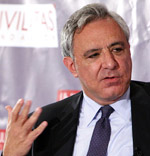The National Security Service of the Republic of Armenia has summoned Armenia’s ex-FM, member of the Prosperous Armenia Party Vardan Oskanyan to offer testimony in relation to a criminal case regarding money laundering. Oskanian made a statement, which reads, “The National Security Service of the Republic of Armenia has summoned me to offer testimony in relation to a criminal case regarding money laundering (based on Clause 3 of Article 190 – money laundering), involving myself and the Civilitas Foundation, which I founded. From the start, the Civilitas Foundation has been transparent, and operated in accordance with the spirit and the letter of Armenian law. Since its first days in 2008, the Civilitas Foundation’s programs have been supported by the governments of the Netherlands and Poland, the foreign ministries of Norway and Germany, the international development organizations of Switzerland and the UK, the US Embassy in Yerevan, the OSCE Yerevan Office, as well as other well-known organizations, corporations and individuals. This has been public information. The government agencies of the Republic of Armenia clearly could not have been ignorant about these relationships. I find it strange and astonishing therefore that my work and the work of Civilitas can in any way be linked to money laundering or illegally acquired funds. Even more astonishing is that such a question is being raised at a time when I have entered politics. It is obvious to me that the criminal case that has been opened is politically motivated.” It is really apparent that the launch of the criminal case against Oskanyan and his Civilitas foundation and it’s clear that the discussion of this case is either meaningless or secondary. However, having into account the recent months activities of Oskanyan – his membership to PAP, PAP’s further approach after the parliamentary elections it will be very hard to give a further evaluation. It would be enough to remember that after the elections and after not joining the ruling coalition the PAP avoids calling itself opposition. And they prefer to stay committed to being “constructive opposition.” Therefore, a question comes out. What would be the benefit of the government to launch a case against Oskanyan and put pressure on the PAP? Why would they want to make PAP a “radical opposition?” This shows that the government would like to show the PAP as a “persecuted opposition” in order to provide smoother presidential elections. It is not excluded that these steps are directed not as much against the PAP but personally against Oskanyan. It means that by doing that the government is trying to neutralize Robert Kocharyan’s influence on PAP to have eternal constructive opposition in the face of PAP. At any rate, the criminal case against Oskanyan shows the reality that the motives are political. Back in the day, Oskanyan wasn’t too worried when the members of opposition have been more harshly persecuted by the government.

